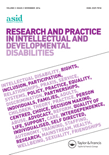
Research and Practice in Intellectual and Developmental Disabilities
Scope & Guideline
Bridging theory and practice in developmental disabilities.
Introduction
Aims and Scopes
- Evidence-based practices:
The journal emphasizes the importance of research that supports effective interventions and practices for individuals with intellectual and developmental disabilities, ensuring that care is informed by the latest empirical evidence. - Policy analysis and advocacy:
It critically examines policies affecting people with intellectual disabilities, particularly in the context of recent governmental inquiries such as the Disability Royal Commission, aiming to influence positive changes in legislation and service provision. - Family and community involvement:
Recognizing the crucial role of families and communities, the journal explores how these support systems can be integrated into care models and decision-making processes to enhance the quality of life for individuals with disabilities. - Cross-disciplinary approaches:
The journal promotes collaboration across various disciplines, including health, education, and social work, to address the complex needs of individuals with intellectual and developmental disabilities. - Cultural competence and inclusivity:
There is a consistent focus on understanding and addressing the diverse needs of individuals from different cultural and linguistic backgrounds, ensuring that services are accessible and appropriate.
Trending and Emerging
- Impact of the Disability Royal Commission:
A significant focus on the findings and recommendations of the Disability Royal Commission reflects an emerging trend to critically assess and influence policy changes in the disability sector, aiming for improved safety and quality of life for individuals with disabilities. - Mindfulness and mental health interventions:
There is a growing interest in the feasibility and effectiveness of mindfulness-based interventions for parents of children with disabilities, recognizing the importance of mental well-being for families. - Social inclusion and community participation:
Recent publications emphasize the importance of social inclusion and community participation, advocating for models that support individuals with disabilities to engage meaningfully in their communities. - Family-centered approaches:
An emerging emphasis on the role of families as integral to the support of individuals with disabilities indicates a shift towards recognizing family dynamics in service provision. - Culturally responsive practices:
There is an increasing focus on culturally appropriate practices, particularly regarding Indigenous populations, highlighting the need for services that respect and incorporate diverse cultural perspectives.
Declining or Waning
- Traditional educational models:
There seems to be a decreasing focus on conventional educational strategies for children with intellectual disabilities, as attention shifts towards more inclusive, holistic, and community-based approaches. - Generic service models:
The publications suggest a waning interest in one-size-fits-all service models, with increasing recognition of the need for personalized and tailored interventions that consider individual circumstances. - Historical analyses of disability:
Research centered on historical perspectives of disability is less prevalent, indicating a move towards contemporary issues and practical solutions rather than retrospective studies. - Medical model perspectives:
There is a noticeable decline in articles that focus primarily on medical or deficit-based views of disability, as the field increasingly embraces social models that advocate for rights and inclusion. - Standardized assessment tools:
The use of traditional standardized assessments is becoming less emphasized, with a shift towards more dynamic and qualitative approaches that capture the lived experiences of individuals with disabilities.
Similar Journals

Exceptionality
Connecting research and practice in exceptional education.Exceptionality is a prestigious peer-reviewed journal published by Routledge Journals, Taylor & Francis Ltd, dedicated to advancing the understanding of exceptional individuals within the fields of developmental and educational psychology. With an ISSN of 0936-2835 and an E-ISSN of 1532-7035, the journal has established itself as a critical resource for researchers, educators, and practitioners interested in exploring the complexities of exceptionalities across various educational settings. Recognized in the Q2 category in both Developmental and Educational Psychology and Education for 2023, and ranking in the upper percentiles of Scopus' education and psychology categories, Exceptionality offers valuable insights through rigorous research and innovative methodologies. Although it is not an open access journal, its articles are accessible through academic libraries and institutional subscriptions, fostering research and collaboration in understanding and supporting individuals with exceptional needs. Since its inception in 1990, the journal continues to attract high-quality contributions, making it an indispensable publication for anyone interested in the nuances of exceptionality and its implications for education and society.
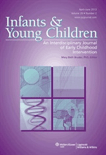
Infants & Young Children
Fostering Understanding of Early Childhood DevelopmentInfants & Young Children is a pioneering journal established in 1988 and published by Lippincott Williams & Wilkins, focusing on the critical developmental phases of infancy and early childhood. With a commitment to advancing research in Developmental and Educational Psychology, Pediatrics, Perinatology and Child Health, as well as Psychiatry and Mental Health, this journal serves as an essential resource for professionals and scholars dedicated to understanding and enhancing the early years of life. As a member of the Q3 category in multiple relevant fields, it informs and stimulates discourse with its impactful scholarly articles, meeting the diverse needs of researchers, practitioners, and policymakers alike. Though access is not currently open, subscribers can expect high-quality, peer-reviewed research that underscores the importance of early experiences in shaping lifelong outcomes. Located in Philadelphia, this journal continues to make significant contributions to child health and education, aiming to bridge gaps in knowledge and ensure a foundation for thriving, healthy futures.
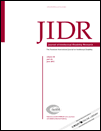
JOURNAL OF INTELLECTUAL DISABILITY RESEARCH
Exploring the intersections of disability, rehabilitation, and mental health.JOURNAL OF INTELLECTUAL DISABILITY RESEARCH is a premier scholarly publication that serves as a vital platform for interdisciplinary research in the fields of intellectual disabilities, rehabilitation, neurology, and mental health. Published by Wiley, the journal boasts an impressive reputation, evidenced by its latest Scopus rankings, which place it in the Q1 category in Arts and Humanities (miscellaneous) and Rehabilitation, while also achieving Q2 status in Neurology and Psychiatry. With an enduring history from 1957 to the present, this journal provides open access to groundbreaking studies and insights that drive forward our understanding of intellectual disabilities and their related challenges. The journal’s commitment to publishing high-quality research makes it an indispensable resource for academic researchers, healthcare professionals, and students seeking to contribute to or learn from the contemporary discourse on disability research. Engage with us as we explore the complexities of intellectual disabilities through rigorous, impactful scholarship.

Education and Training in Autism and Developmental Disabilities
Bridging Research and Practice for Exceptional LearnersEducation and Training in Autism and Developmental Disabilities is a prominent journal published by the Council for Exceptional Children, focusing on innovative research and insights in the field of autism and developmental disabilities education. With an evolving scope since its inception, the journal emphasizes the importance of evidence-based practices, pedagogical strategies, and interdisciplinary approaches to enhance educational outcomes for individuals with autism and related conditions. Although it currently holds a Q3 category in Developmental and Educational Psychology and is ranked in the Q2 category in Education, it continues to gain recognition with a respectable placement in Scopus rankings—indicating that it plays a crucial role in informing educational practices and policy decisions. Researchers and practitioners can access a wealth of information through its open access options, underscoring a commitment to disseminating knowledge widely. By bridging the gap between research and real-world application, this journal serves as an essential resource for education professionals seeking to advance their understanding and improve the quality of education for neurodiverse learners.
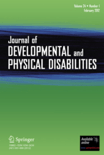
JOURNAL OF DEVELOPMENTAL AND PHYSICAL DISABILITIES
Enhancing quality of life through evidence-based insights.JOURNAL OF DEVELOPMENTAL AND PHYSICAL DISABILITIES is a premier publication dedicated to the advancement of knowledge within the realms of developmental psychology, rehabilitation, and therapeutic practices. Published by Springer/Plenum Publishers, this journal serves as a critical platform for researchers, clinicians, and educators who are passionate about understanding and improving the lives of individuals with developmental and physical disabilities. With an impressive Timeline spanning from 1991 to 2024, it holds significant rankings in Category Quartiles, including Q3 in Developmental and Educational Psychology and Q2 in Physical Therapy, Sports Therapy, and Rehabilitation. The journal reaches a broad audience in the United States and beyond, providing insightful research articles that contribute to both theoretical and practical applications in the field. Although not currently an open-access platform, its strategic positioning within Scopus rankings underscores its importance, featuring a rank of 80/247 in Health Professions and 163/360 in Psychology. The journal is an essential resource for those committed to promoting evidence-based practices and enhancing the quality of life for people with disabilities.
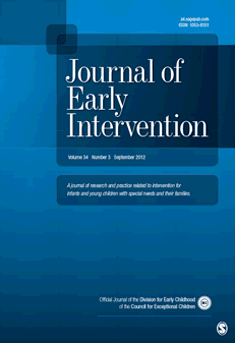
JOURNAL OF EARLY INTERVENTION
Bridging Research and Practice in Early ChildhoodThe Journal of Early Intervention, published by SAGE Publications Inc, is a critical resource in the fields of Developmental and Educational Psychology, Pediatrics, and Psychiatry and Mental Health. Established in 1981 and continuing to present, this esteemed journal aims to advance the study and practice of early intervention for young children with developmental delays and disabilities. With an impact factor that reflects its significance—holding Q2 and Q3 rankings in various relevant categories—this journal offers vital insights into evidence-based practices, innovative research findings, and theoretical developments that enhance our understanding of early childhood interventions. Although not open access, the journal is accessible through institutional subscriptions, ensuring that researchers, practitioners, and students can engage with cutting-edge studies and discussions. As it spans over four decades of scholarship, Journal of Early Intervention serves as an indispensable tool for those dedicated to improving outcomes for young children and their families.
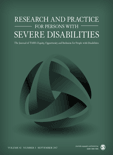
RESEARCH AND PRACTICE FOR PERSONS WITH SEVERE DISABILITIES
Fostering multidisciplinary dialogue for a better tomorrow.RESEARCH AND PRACTICE FOR PERSONS WITH SEVERE DISABILITIES, published by SAGE Publications Inc, is a premier academic journal dedicated to advancing the understanding and enhancement of quality of life for individuals with severe disabilities. Since its inception in 1975, it has provided a critical platform for groundbreaking research and innovative practices within the fields of health professions, public health, and social psychology. With a commendable impact factor and a recognition of being placed in the Q1 quartile for Health Professions and Q2 for both Public Health and Social Psychology, this journal is a vital resource for researchers, clinicians, and policymakers alike. The journal not only disseminates scholarly articles that explore evidence-based interventions but also emphasizes the importance of community engagement and policy advocacy. By fostering a multidisciplinary dialogue, it aims to inform best practices and promote inclusivity for persons with severe disabilities. Access to the journal's rich archives and contemporary articles is streamlined, making it an indispensable tool in the scholarly community. For further information and to explore current research, visit the journal's page on the SAGE Publications website.
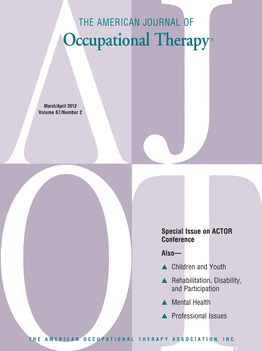
AMERICAN JOURNAL OF OCCUPATIONAL THERAPY
Championing Excellence in Occupational Therapy ScholarshipThe American Journal of Occupational Therapy (AJOT), published by the American Occupational Therapy Association, Inc., serves as a cornerstone for research and practice in the field of occupational therapy. Established in 1947, this esteemed journal has a strong track record of contributing to the scientific dialogue surrounding occupational therapy, evidenced by its prestigious rankings in both the Q1 and Q2 category quartiles for 2023, reflecting its impactful presence in the broader discipline of medicine. With an eminent position as Rank #5 out of 31 in the health professions category, AJOT is dedicated to promoting evidence-based practices that enhance the quality of life for individuals through the therapeutic use of everyday activities. Although not open access, the journal provides critical insights and research findings instrumental for researchers, professionals, and students alike in advancing the field. As we look toward the future, AJOT continues its commitment to facilitating knowledge exchange and advocacy within the domain of occupational therapy, ensuring its relevance and significance through 2024 and beyond.
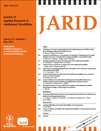
JOURNAL OF APPLIED RESEARCH IN INTELLECTUAL DISABILITIES
Exploring New Frontiers in Intellectual Disability Studies.The Journal of Applied Research in Intellectual Disabilities, published by Wiley, is a pioneering platform dedicated to advancing knowledge and promoting best practices in the field of intellectual disabilities. With an impressive impact factor reflecting its significance—ranking in the Q2 category for Developmental and Educational Psychology and the Q1 category for Education in 2023—this journal serves as an essential resource for researchers, practitioners, and students alike. Its wide contribution to social sciences is evidenced by its high standings in Scopus rankings, positioned at Rank #297 in Education and Rank #103 in Developmental and Educational Psychology. This journal not only fosters innovative empirical and theoretical research but also encourages the dissemination of practical solutions to enhance the quality of life for individuals with intellectual disabilities. With access options available to meet diverse needs, including open access, it strives to make impactful research widely available, bridging the gap between academic research and practical application.
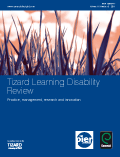
Tizard Learning Disability Review
Connecting research with real-world applications.Tizard Learning Disability Review is a prominent academic journal dedicated to advancing research and knowledge in the field of learning disabilities and related disciplines. Published by Emerald Group Publishing Ltd, this journal serves as a critical resource for researchers, practitioners, and educators, facilitating the dissemination of innovative ideas and evidence-based practices. With an ISSN of 1359-5474 and an E-ISSN of 2042-8782, it has been providing a forum for critical discussions since its inception in 1996, continuing its contributions well into 2024. The journal is characterized by its diverse scope, focusing on key areas such as Clinical Psychology, Educational Psychology, and Psychiatry, while maintaining Quality Quartile rankings of Q3 in Clinical Psychology and Q4 in other significant areas according to 2023 metrics. Although Open Access options are not currently available, the journal remains an essential scholarly platform for exploring the multifaceted challenges faced by individuals with learning disabilities. Emphasizing interdisciplinary approaches, it aims to bridge gaps between research and practice, fostering collaboration among academics, healthcare providers, and educators.